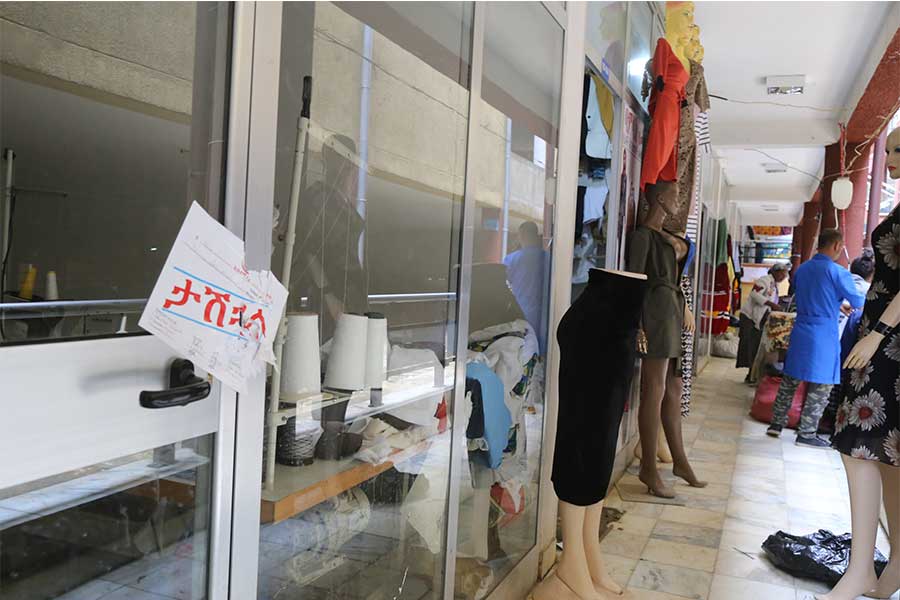
Editorial | Aug 19,2023
Headline inflation, an indicator of the cost of living, rose for the second successive month to 22.3pc, marking the highest figure of the new fiscal year.
Measured by the Consumer Price Index (CPI), the average rate of increase in the price of goods and services depicts a 0.7-percentage-point rise from the previous month, according to the latest data from the Central Statistical Agency (CSA).
Primary upward pressure came from a surge in food product prices, mainly cereals and vegetables. The rate is more than double the figure that the government targeted for the current fiscal year.
For the newly started budget year, the Ministry of Finance intended to control the headline inflation rate to single digits at 9.8pc. This is despite the 19.9pc annualised average inflation rate that was registered in the recently ended fiscal year.
In July, food inflation registered an almost two-percentage-point rise, while non-food inflation has shown a slight dip of 0.8 percentage points.
Vegetables - onions, potatoes and tomatoes in particular - registered a rapid surge in their prices and tended to drive up overall food inflation. The cost of black pepper also continued to rise last month following the trend of previous months, according to the report.
Since May, the prices of onions and tomatoes, which are widely consumed in many households throughout the country, have doubled. Currently, onions and tomatoes are sold at 30 Br and 28 Br a kilogram, respectively.
The rise in inflation in the non-food component is steadily increasing due to soaring prices for alcohol and tobacco, khat, housing repair and maintenance, energy, transportation and medical care.
On a month-to-month basis, which measures the price change between the two latest months, inflation rose by two percent from June to July.
On top of eroding consumer purchasing power, the higher inflation rate is causing macroeconomic imbalances, according to Ahmed Shide, minister of Finance, speaking at a discussion over the 10-Year Development Plan that was designed by the National Planning & Development Commission.
The Ministry of Finance and the National Bank of Ethiopia will work on controlling the rate by combining public finance management as well as monetary policy, according to Ahmed, who explained the targets of the 10-Year Financial Sector Plan.
One of the instruments to be used to control inflation, according to Ahmed, is working on keeping the average budget deficit rate at no more than three percent of GDP.
“Following a strict fiscal policy,” he said, “we’ll gradually stop direct borrowing from the central bank.”
Aiming to control the inflation rate within the targeted figures, the government has also designed the treasury bill to be market-driven, according to Ahmed.
Starting from the end of last November, the central bank has enabled interested individuals and financial institutions to buy treasury bills through an auction, allowing the market to determine the yield rate. Before the new system was launched, the financial institutions and individuals were not interested in buying the T-Bill since the average weighted yield of the bill stood at 1.42pc.
Alemayehu Geda (PhD), a macroeconomist and a university lecturer at Addis Abeba University, recommends that the government aggressively work on domestic production and cut expenditures to control the rate from further growth.
Aggressive work on wheat and teffproduction, making necessary consumer products available to the public at a reasonable price, cutting capital expenditures and avoiding further depreciation of the Birr against the dollar could help the government control the rate from swelling further, according to the macroeconomist.
Yinager Dessie (PhD), governor of the central bank, has also said that in the coming 10 years the government will focus on working to boost productivity and supply, substitute imports and improve the regulatory capacity to attain the plan of keeping the inflation rate in the single digits.
PUBLISHED ON
Aug 08,2020 [ VOL
21 , NO
1058]

Editorial | Aug 19,2023

Editorial | Jun 22,2024

Commentaries | Feb 13,2021

Fortune News | Mar 02,2019

Fortune News | May 20,2023

Radar | Feb 08,2020

Fortune News | Oct 11,2020

Viewpoints | Jul 30,2022

Radar | Feb 02,2019

Featured | Sep 28,2019

Dec 22 , 2024 . By TIZITA SHEWAFERAW
Charged with transforming colossal state-owned enterprises into modern and competitiv...

Aug 18 , 2024 . By AKSAH ITALO
Although predictable Yonas Zerihun's job in the ride-hailing service is not immune to...

Jul 28 , 2024 . By TIZITA SHEWAFERAW
Unhabitual, perhaps too many, Samuel Gebreyohannes, 38, used to occasionally enjoy a couple of beers at breakfast. However, he recently swit...

Jul 13 , 2024 . By AKSAH ITALO
Investors who rely on tractors, trucks, and field vehicles for commuting, transporting commodities, and f...

Nov 1 , 2025
The National Bank of Ethiopia (NBE) issued a statement two weeks ago that appeared to...

Oct 25 , 2025
The regulatory machinery is on overdrive. In only two years, no fewer than 35 new pro...

Oct 18 , 2025
The political establishment, notably the ruling party and its top brass, has become p...

Oct 11 , 2025
Ladislas Farago, a roving Associated Press (AP) correspondent, arrived in Ethiopia in...